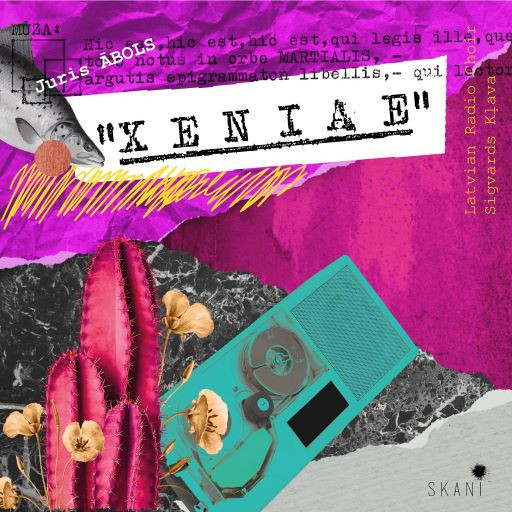Kā vērtēt mūziku, kas neatgādina neko, ko esi iepriekš dzirdējis? Kā runāt par mūziku, kas met līkumu visam, uz kā balstās tava mūzikas izglītība? Varbūt drīzāk iet tieši tai cauri, bet tik ačgārnā veidā, ka viss pazīstamais top nezināms un otrādi. Juris Ābols izārda priekšstatus un sakārto tos negaidītās un pavisam neparastās kombinācijās. Viņš iet savu ceļu, un tas ir brīnišķīgi. Muļķīgi, citreiz pat banāli, bet vienmēr pareizajā vietā un laikā. Klausītājs tiek novests raibā un greizā Aizspogulijā. Ceļojums paskrien garām nemanot, jo viss savādais saausts izteikti organiskā veselumā. Izcila dramaturģijas izjūta. Te vieta vēl dažiem slavas vārdiem ieskaņojumam – skaņas inženierija rada patīkamu vidi, kurā uzturēties. Tās pamatā – labs balanss starp visiem atskaņotājmāksliniekiem. Jura Ābola operu iesaku dzirdēt ikkatram, jo tā izaicina, provocē un pārsteidz. Varbūt tā palīdz apjēgt, ka sevi un mūziku uztveram pārāk nopietni. Būtu kļūdaini domāt, ka tas ir pilnīgs nonsenss un ka tas neko nenozīmē. Drīzāk vien to, ka autora loģika mums, visticamāk, nav saprotama. Tas dažkārt mēdz tracināt, tomēr šeit apjukums un neizpratne ir tieši tas, kas vajadzīgs. Kāpēc nē?
Ideja *****
Atskaņojums *****
Baudījums *****
Ernests Valts Circenis
Mūzikas Saule Nr. 4 (112) 2022
_________________________________________
20. gadsimta sākumā Eiropas tradicionālās vērtības ir monarhija ar imperiālistisku pasaules redzējumu, kas izraisīja karu. Dadaisms iesāka tradicionālo vērtību dekonstrukciju, lai radītu jaunu pasaules kārtību, un galvenie izteiksmes līdzekļi ir šokēšanas taktika un iracionalitāte. Nezinu, vai 21. gadsimtā šoka terapija vēl darbojas, taču Juris Ābols pārsteidz ar māksliniecisko godīgumu, atklātību un spēju nosaukt lietas īstajos vārdos, un “tikai dēļ prāta un padoma gudra Cilvēkus l a b ā k u s audzināt varam!” No vienas puses, varam uztvert to kā Freida sapņu analīzi, bet, no otras, tas var būt iekšējais monologs, brīvās apziņas plūsma, kas risina pietiekami sarežģītus jautājumus. Tā aplūko viltvārža sindromu (“Tāpēc… ka tu… esi… i-d-i-o-t-s!”), māca atpazīt lielību, taisnošanos, skaudību… Ābols nevairās no alūzijām reklāmas biznesā (I’m lovin it!), kariķē Pučīni Turandotas otro cēlienu (Marciāls aptaujā: “Tas pareizi!”), izcili stilizē Hendeļa mūziku (Oda ārija), un operas finālā liktas iespaidīgas koloratūras soprānam solo! Šeit Latvijas Radio koris pilnībā attaisno savā nosaukumā iekļauto vārdu ‘radio’ – ir iestudēta patiesi satriecoša radioopera [‘glɔ:rɪfɪ’keɪʃn]. Uz mirkli aizdomājos, vai es gribētu šo iestudējumu redzēt uz skatuves, bet vai maz to vajag? Varbūt radio tieši ir tas pareizākais formāts, un šis darbam jāpaliek akusmātiskam? Ja nu vienīgi kā animācijas filma…
Ideja *****
Atskaņojums *****
Baudījums *****
Armands Skuķis
Mūzikas Saule Nr. 4 (112) 2022
__________________________________
Described variously as a happening and a Buddhist Dadaist, in his opera Latvian composer Juris Ābols has created a crazily seductive polystylistic extravaganza. The Latvian composer Juris Ābols is certainly not a well-known name, and even in his native Latvia people have difficulty quantifying him, describing him as 'a happening, an event, an experience'. His father was the painter, Ojārs Ābols, one of the most significant and vivid abstractionists of the second half of the 20th century. His mother was the literary scholar Mirdza Ābola, who specialized in the Belarusian language. Ābols' musical career seemed to encompass the flute, composing, playing in a violin, piano and flute trio and a period as an organist. The first concert of his music did not take place until 2020 at the Latvian Radio studio, shortly before his death, and at the concert Ābols would say "I’ve completed a full 360-degree circle, beginning with an exercise in harmony to Dadaism and back again, slowly approaching an eight-part chorus and classical harmonies. It’s a natural path. And I’m perfectly happy with it. Because I’ve achieved everything. All that’s left are the magarichas [a drink or meal to seal the deal], as the Gypsies say."
Ābols seems to have very much been a one-off, not only musically but in terms of his approach to society. The conductor Sigvards Klava describes Ābols thus, "Juris Ābols always appeared at a certain time and place with something in his hand, perhaps a musical score – uninvited, but he nevertheless appeared, and things often happened soon after that arrival...
Ābols did not fit into the norms of society. For example, he smeared himself with turpentine to avoid getting sick. Some people enjoy that sort of thing, others don’t. But also just all the normal household and financial issues. We usually don’t share with others when we’re going through a rough patch in our lives. The pipes freeze, the electricity is cut off. If you haven’t got anyone to talk to… Clearly, the art world is heartless in the sense that it provides no social safety net."
In the Summer of 2010, Ābols brought a bucket of sheet music to Klava's house; it took a week to sort the music into order but the result was Ābols' opera Xeniae. It was recorded in the basement of Klava's house over that Summer, with Ābols always present (he plays saxophone on the recording and plays the character of Gigabyte).
Xeniae uses Ābols' own polyglot libretto, described as 'based on motifs in the work of Martial and Arisophanes' and the result is crazy, bewildering and bewitching. He uses bizarre mix of languages including English, Latvian, German and Ancient Greek, so that Martial's muse, Thais, has a long speech in German. That 2010 recording has now been issued on the SKANI label, and we can marvel at the sheer craziness, Ābols' bewildering talent.
So what is the opera about? Whilst there are characters from Martial and Aristophanes, there is also Micropixel and Gigabyte. To give you a flavour, here is the opening to Scene III:
GIGABYTE: When the black radish is driven into his ass and the hair there is singed,
How will he prove that he does not have a wide ass?
DEMOSTRATUS: And even if he had a wide ass, what harm would there be?
CHORUS: How awful that you look only at his backside!
/ the buzz of a mosquito is heard /
MICROPIXEL / interrupts /:
Wait, wait, wait… you two are flapping around in the air here, just like…
/ Half-asleep, MARTIAL hunts down the mosquito, hits it, and goes back to sleep. /
According to Klava, the opera is about 'the place and existential struggle of the creative person in today’s global and cosmic world', but there is a distinct whiff of satire about the libretto, as if Arisophanes' comedy was being filtered through the Goons and Monty Python.
Musically, the work is equally puzzling yet appealing. To describe it as polystylistic is understatement, there is everything there from Monteverdi and Orff to klezmer, bouzki and jazz. All rubbing up cheek by jowl, the style can turn on a pin and the work has a distinct collage-like quality. There is something very 1980s about the feel to the work, the idea that a musical drama can be anything we want it to be.
The resulting recording is sui generis and has to be experienced to be believed. At the time, Klava commented to Ābols the impossibility of staging the work, to which Ābols replied that that was our problem not his. Technological developments have meant that we can even begin to consider this, but first the recording. Made in 2010 and recently remastered it is a little bit of history and rather brilliant. There is no sense of the haphazard nature of the enterprise, and the result has a surprising coherence and a seductive craziness.
The disc includes a lively booklet in Latvian and English which seems to include images from Ābols 'original work, and tries to put this unquantifiable figure in some sort of context. My only complaint is that the printed libretto is featured in the original polyglot text and in Latvian, with no English translation.
The biography of Ābols on the Musica Baltica website has perhaps the most apposite quote about his work, "The sounds of his opuses can be tinted with a resigned, sad smile, along with that, those enjoying his musical process are given the question: But why?... "
Robert Hugill
www.planethugill.com, 17/08/2022
_______________________________________
For Latvian Radio Choir artistic director Sigvards Klava, his compatriot Juris Ābols (1950-2020) was more ‘an event, a happening, an experience’ than a composer. Recorded in the basement of Klava’s house in Riga, 2010, Opera Xeniae is testament to a unique figure, whose fascination with global cultural history and human behaviour found expression in wild creative imagination.
The work is a Dadaist collision of characters known and invented from ancient and modern times, centring on the Roman writer Martial, whose book of epigrams Xenia (‘gift’) loosely forms the basis of Ābols’s libretto. Martial himself features alongside his own addressees, Thaïs – ‘the erotic aspect’; Muse – ‘the creative aspect’; Demostratos; Coryphaeus – and Ābols’s seemingly random and part-inebriated Dankeschön, Gigabyte and Megapixel.
They are lovingly sung by members of the Choir, which otherwise observes their nonsensical but heated arguments covering topics from the meaning of art, to serotonin in bananas and ‘how you bake cakes from a pig’.
It’s brilliant in ways impossible to unravel, pointing to truths about human nature – and the fantastical wonder of opera as an art form.

